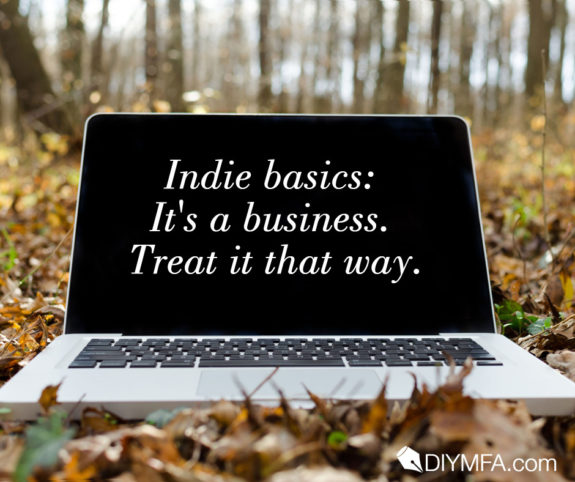Maybe you’re sold on the independent publishing model. Maybe you’ve even written a book and published it on Amazon, but nobody’s bought a copy except your mom. Where is the publishing glory you were promised?
You can’t leave it all up to Amazon. If you want to make a success of independent publishing, be prepared to work. Independent publishing is a business. You need to treat it that way.
It’s all about mindset
Successful independent authors split their time between thinking like writers and thinking like publishers. There’s time to be creative and artistic, but there’s got to be time for clear, business-focused thinking, too. If you take the time to set up your business properly, it can help support you and your heirs for a long time.
If that seems daunting, or if you don’t think of yourself as an entrepreneur, don’t worry. Go slowly and stay focused on your goal. Here are five key steps to making a good start in indie publishing.
1) Write first
You can’t run a business without something to sell, so take your time and write the best manuscript you possibly can. Rushing a book to market is a waste. Read books on writing craft, but also study other authors you like (traditionally or independently published). Analyze their style. When you notice a phrase that grabs you, stop and ask yourself, why does it grab me? Pick it apart.
One classic exercise is to rewrite a page of your own writing in the style of a famous author. You’ll learn a lot about how and why good writing works. Apply what you’ve learned as you revise your work, then revise it again. Treat writing like a job and show up on a schedule that’s sustainable for you.
2) Do your homework
Read up on the publishing industry and on successful marketing strategy. Independent authors are often generous with their knowledge and experience. Blogs and podcasts like Joanna Penn’s The Creative Penn or Mark Dawson’s Self Publishing Formula can give you helpful insights into this vast creative world. And be careful of anyone who promises overnight success.
Indies can reach global audiences with the click of a button. But it doesn’t matter if your office is a humble desk in the corner of your bedroom, you’re still running a global business and you must understand its legal implications, so include those topics in your research.
GDPR is one example. Those Terms and Conditions agreements you’ll be asked to sign are another—they’re binding contracts. Research the markets you want to reach, and let the complexities of those markets guide your strategic plan. I’ll write more on legal considerations in a future post.
Don’t freak out. Yes, the volume of information can get overwhelming, and at times you’ll feel like you’re eating an elephant. Just take it one bite at a time (see also #5: Be patient with yourself.).
3) Draft a business plan
Even if it’s nothing more than a list of goals and a paragraph about your vision, write it down and post it near your desk where you’ll see it every day. Better yet, share your goals with a supportive friend. Research by Professor Gail Matthews of Dominican University demonstrates that people who write down and share their goals are more likely to achieve them. As you grow in your experience, your business plan can grow in scope and detail. Plentiful resources on the internet exist to help entrepreneurs create and update business plans. Do some searching and find one that works for you. Remember, you can always update it.
If you want to go deeper than a simple list on a scrap of paper, draft a few SMART goals. SMART goals, a well-known technique from the business world, are Specific, Measurable, Achievable, Relevant, and Time-Bound. “I want to be the greatest author of all time” is not a SMART goal. “I will publish my first 40,000 word e-book on Amazon by January 31, 2019” is a SMART goal. This blog post by Emily Esposito is a solid resource on how to write SMART goals. In a future post we’ll look at writing goals and mapping out our own paths to publishing success.
4) Spend money strategically
Yes, you have to spend money to make money. But just as in other kinds of business, nothing in publishing is guaranteed. The advantage of indie publishing is that you have more control: you can test, tweak, and tailor all aspects of the business—even after your book is published—to improve your success.
But it’s also easy, especially as you’re getting started, to spend large sums of money very fast. It’s important to be strategic in the way you spend what money you have available to you.
If there’s one ironclad rule of thumb in indie publishing, it’s this: Invest in the quality of your books. If you have only a small amount of money to spend, invest it on two things:
1) Professional editing
2) Quality cover design
These two factors will do more than anything else to present a professional product to the world. You may be a gifted and visionary storyteller, but if your grasp of grammar is tenuous at best and your artistic training topped out when you made a turkey from your handprint in kindergarten, no one is going to read your work.
In future posts we’ll consider how to find and hire quality professionals for your publishing team, but for now, understand that you’ll need these professional services. If your current budget limits you to accepting a self-made cover and the proofreading help of a sharp-eyed friend, that’s okay. Plan to use your first profits to upgrade your cover and your editing. It will always, always pay you back.
5) Be patient and honor your reality.
At DIY MFA, we talk about “honoring your reality.” Independent publishing works beautifully with this philosophy, because you are in control. You can take all the time you need, working at the pace that your schedule permits, with the budget you have available to you, and in a way that plays to your strengths.
- Schedule: Assess your situation. What time do you have available, not only to write, but to manage the business? You may be working a day job (or two). Maybe you have family or community commitments as well. As you start out, business may need to take a back seat to writing. In fact, it’s not a bad idea to hold off on launching your independent publishing business until you have three books to promote. (I’ll address why in a future post).
- Budget: How much money can you invest in this venture? Keep in mind that going into indie publishing means taking a business risk. Don’t spend money you’re not prepared to lose, and never, never go into debt to launch your publishing career. If you must choose between paying your bills or spending money on your book, for heaven’s sake, pay your bills. There are ways to work around a tight budget, and we’ll examine those in a future post.
- Assess your strengths and weaknesses so you can assemble a good team: We can’t all be good at everything. If balancing your checkbook induces a migraine, you may want to hire a bookkeeper or accountant for your publishing business. If social media bewilders you, plan to consult a publicist. Great at coming up with catchy or memorable lines? You might make a brilliant copywriter. Some independent authors build their businesses by trading services. You write their marketing blurbs while they copy-edit your book, and so on. As always, if you’re low on funds, take your time and do tasks yourself. As you learn where your skills lie, you can make strategic decisions about which professionals to bring onto your team.
Bonus tip #6: Have fun.
All this talk of strategic plans, legal obligations, and global markets can sound scary, but it shouldn’t. Take it slowly and treat it seriously, but don’t let it frighten you away. Resources are out there to help you make informed decisions. The indie community is endlessly supportive. With the right mindset and a willingness to learn, you can do it.
 Helen J. Darling writes contemporary women’s fiction. Her first novel, I’ll Know Me When I Find Me, was self-published in January 2018. You can connect with her at itshelendarling.com.
Helen J. Darling writes contemporary women’s fiction. Her first novel, I’ll Know Me When I Find Me, was self-published in January 2018. You can connect with her at itshelendarling.com.







